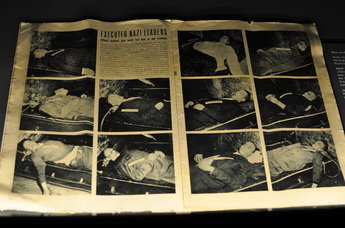The VerdictFor the 21 defendants, there were 11 death sentences, 7 prison sentences, and 3 acquittals. The acquittals were a result of the IMT's insistence that even those accused of heinous crimes had the right to a fair trial.
|
|
Guilty - Sentenced to Death |
Guilty - Sentenced to Prison |
Not Guilty |
(Images courtesy of University of Missouri)
Executions
|
Newspaper article & images about the executions
(Nuremberg Documentation Center) |
To avoid creating pilgrimage sites for future Nazis, executed individuals were cremated and their ashes thrown in a river. "As they went to the gallows, most of the ten endeavored to show bravery. Some were defiant and some were resigned and some begged the Almighty for mercy." - Reporter & Eyewitness Kingsbury Smith
|
